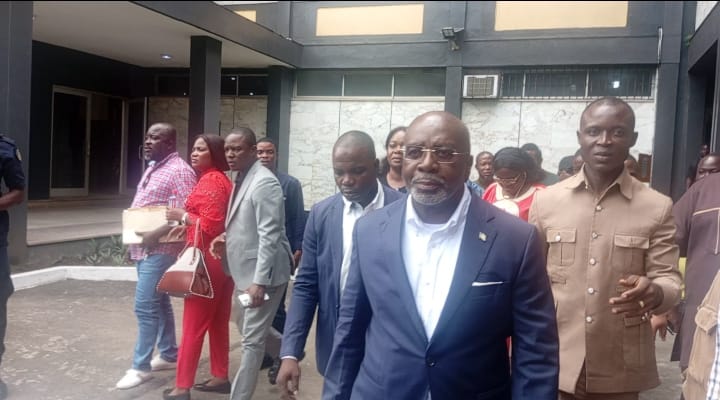The ongoing trial concerning the arson of the Liberian Capitol Building has taken a dramatic turn with the defense team for former House Speaker Jonathan Fonati Koffa and three of his colleagues filing a motion to suppress key evidence presented by the prosecution. The defense argues that the evidence, comprising audio recordings and WhatsApp messages allegedly implicating the defendants, was obtained illegally without a valid search warrant. They contend that the evidence was initially extracted in December 2024 and subsequently analyzed by the National Security Agency (NSA). However, a search warrant was only obtained a month later in January 2025, which the defense claims was a retroactive attempt to legitimize the already seized evidence. This procedural irregularity, they assert, renders the evidence inadmissible.
At the heart of the defense’s argument is the contention that the NSA, being an intelligence agency and not a criminal investigation body, lacked the legal authority to conduct the forensic analysis in the arson case. The defense points to the fact that all documentation related to the evidence gathering and analysis, including the arson investigation report, bears the NSA’s signature, further solidifying their claim of procedural impropriety. They maintain that any evidence derived from this unauthorized investigation should be excluded from the trial. The defense’s position is that the prosecution, anticipating challenges to the legality of the evidence collection, sought the search warrant in January as a belated attempt to rectify the initial illegal seizure.
The backdrop to this legal wrangling is the politically charged atmosphere surrounding the arson incident, which occurred amidst rising tensions following Koffa’s removal as House Speaker. The prosecution alleges that the arson was a deliberate act orchestrated by opposition lawmakers, including Koffa and several representatives, to disrupt legislative processes. The charges against them range from arson and attempted murder to conspiracy and illegal possession of firearms. The case has been further complicated by disputes over bail conditions, with the defense previously challenging Judge Willie’s rulings at the Supreme Court, alleging violations of constitutional rights.
The defense maintains that the prosecution’s actions constitute a clear violation of established legal procedures, undermining the integrity of the evidence and jeopardizing the defendants’ right to a fair trial. They argue that the retroactive acquisition of the search warrant does not cure the initial illegality of the evidence seizure. The defense emphasizes that the legal principle of “fruit of the poisonous tree” applies in this situation, whereby evidence obtained through illegal means is inadmissible in court, as is any subsequent evidence derived from it. They contend that the search warrant, obtained after the fact, cannot legitimize an already tainted process. The defense calls for the court to uphold the fundamental principles of due process and exclude the illegally obtained evidence.
Judge Willie’s decision to transfer the defendants back to Monrovia Central Prison from Kakata Central Prison has added another layer of complexity to the proceedings. While the judge cited jurisdictional issues and the defendants’ right to adequate legal counsel as the reason for the transfer, asserting that their detention in Kakata hampered their access to legal representation, the move is viewed by some as a significant development in ensuring a fair trial. This decision highlights the importance of upholding the defendants’ rights throughout the legal process, regardless of the gravity of the charges against them.
The ongoing legal battle underscores the importance of adhering to due process and respecting constitutional rights, even in high-profile cases with significant political implications. The defense’s persistent challenges to the prosecution’s evidence and their emphasis on procedural fairness highlight the critical role of the judiciary in safeguarding these fundamental rights. Judge Willie’s decision to reserve ruling on the motion to suppress the evidence suggests a careful consideration of the legal arguments presented by both sides. The outcome of this ruling will undoubtedly have a profound impact on the trajectory of the trial and the fate of the accused. The case continues to attract significant public attention, reflecting the broader concerns about political stability and the rule of law in Liberia.


